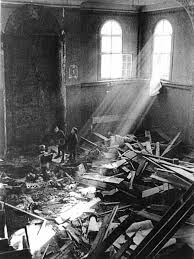When I visited the German village where my grandfather grew up, our guide was an elderly man named Edzard who was a small boy in 1938. As an adult, he spent decades researching the history of Wittmund’s Jews, including my grandfather. He gave me a copy of a letter stamped, “Heimat!” meaning, “Secret!” It was dated November 10, 1938 and contained the report sent back by the SS men who had carried out their “Kristallnacht” mission in Wittmund a day earlier. Evil is masked with the use of neutral phrases: “protective custody,” “group transportation,” the “secure custody” of cash and goods, “supervision of the Fire Brigade.” The letter, in its awful entirety, follows:
The action against the Jews in the District of Wittmund happened without any particular incident. Of the three still remaining Jewish retail stores, two were damaged and one only somewhat. All Jewish people were kept by the S.A. in protective custody. However, women and children were released in the early morning hours. As originally commanded, the Jewish men were deported to Oldenburg by group transportation.
All cash secured by the S.A. during the action remains in secure custody with the local S.A. Administration. In the same way, the complete inventory of the Jewish retail stores was secured by the N.S.V. The exact amount of cash and the quantities of merchandise are not known to this office.
The burning of the synagogue (in the nearby town) created some problems, since the synagogue is located in the old part of town and is closely surrounded by old buildings. Under supervision of the Fire Brigade, the surrounding buildings could be protected and damage avoided. The Jewish-owned “Horster Grashaus’ agricultural enterprise was put under the guardianship of the District Farm Director in order to secure orderly, uninterrupted continuation of the activities.
Edzard used different words. Jews were taken from their homes and beaten while their houses and stores were looted. They were then herded to a building for cattle near the marketplace, beaten some more and kept over night. In the morning, the men were taken to Oldenburg and then to a concentration camp. The women and children were let go, though it is unlikely that they got very far. Indeed, a number show up later on a memorial we visited marking their journey’s end in Auschwitz or Ravensbrück or Thereisenstadt.
I wondered aloud that the handful of Jews left in Wittmund were deemed important enough to warrant their own pogrom. Indeed, said Edzard, their lives had no import other than to allow the regional Nazi leaders to get in on the action. After the war, a 1949 newspaper article noted the trial and judgment meted out to the perpetrators who came to Wittmund. Ten men were sentenced to serve three months to a year in prison. The average time served was five months. Two had their arrest warrants repealed for “reasons of mercy.” Before long, they could all go on with their lives as if nothing had happened.
